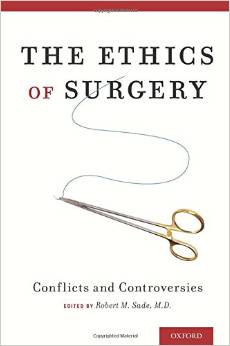ALERT!
This site is not optimized for Internet Explorer 8 (or older).
Please upgrade to a newer version of Internet Explorer or use an alternate browser such as Chrome or Firefox.
Book Review - The Ethics of Surgery: Conflicts and Controversies
The Ethics of Surgery: Conflicts and Controversies
Robert Sade, Editor
Oxford University Press
ISBN 0190204524, 384 pages. $33.25
When we think of medical ethics or bioethics, often what first comes to mind are controversial political issues such as abortion, embryonic stem cell research, euthanasia, and physician-assisted suicide. So, what occurs to us when someone mentions surgical ethics? Perhaps nothing at all, or maybe we have seldom heard the phrase “surgical ethics” or “ethics of surgery.” It may seem to us that ethical problems are somewhat remote from our daily lives as surgeons. This “ethics gap” in surgery is not a figment of our collective imaginations. An article, now published 20 years ago, documented far fewer references to ethics in surgical journal articles than in medical journals. Dr. Robert Sade has made it his personal mission to address this deficiency by pioneering efforts to educate surgeons in ethics, and to help truly establish the field of surgical ethics. The Ethics of Surgery: Conflicts and Controversies represents the latest of his efforts.
As cardiothoracic surgeons, we consciously or subconsciously face a wide range of ethical issues every day in various aspects of our professional lives. These include matters common to other physicians, such as end-of-life questions in the intensive care unit, though even here our perspective as surgeons is often different than that of other specialists. For example, when should we decline to offer an operation to a patient who rejects long-term ventilator support? Or, on the other end of the spectrum, must we accede to patient or family demands to perform an operation that we consider to be futile? There is no longer much controversy regarding the appropriateness of withdrawal of life-sustaining treatments from patients who have a poor prognosis, but surgeons face an additional and more personal dilemma: is it licit to procure solid organs from a potential donor who is “not quite” dead? Other ethical problems we address in our daily patient care involve controversies in providing appropriate information to patients and families so that they can make decisions regarding their own health care, balancing the principles of autonomy and beneficence. Similarly, although medical doctors must deal with pharmaceutical representatives in a manner that avoids creating conflicts of interest, the relationship between surgeons and device companies has traditionally been much closer. How can we work alongside device manufacturers to optimize development of the best tools for our work without allowing the entry of bias?
Beyond the bedside, so to speak, surgeons often participate in the development of institutional and even state or national policies in health care, as advocates for our patients and colleagues. To what extent does my responsibility extend beyond my own patient, to use resources wisely, and to benefit the whole population? When do the needs of the many outweigh the needs of the few, and how must I balance these competing interests?
The Ethics of Surgery: Conflicts and Controversies addresses in a concise and readable way these issues and more in surgical ethics. The book is a collection of ethical questions, most centered on a patient vignette, in which each side of a given question is argued and then Sade provides a summary commentary addressing the ethical principles. These questions are organized into sections focusing on specific areas in surgical ethics such as professional integrity, relationships with patients, and innovation/use of technology. Most of the current bioethical issues that surgeons confront in their professional live are covered, and as such, the book can serve as an excellent starting point for surgeons, surgical residents, medical students, and other health care professionals who would like to have an overview of surgical ethics. Also, because of the format of the book, the arguments formulated, the ethical summaries presented by Sade, and the references provided for each chapter, it can serve as an excellent resource for students of bioethics who want to understand any given issue from different perspectives, or who may be called upon to argue one or another side of a current debate. In summary, reading the book will give you an excellent basic understanding of surgical ethics, and having it on your shelf will provide you a reference to review and begin to research any given ethical question.





